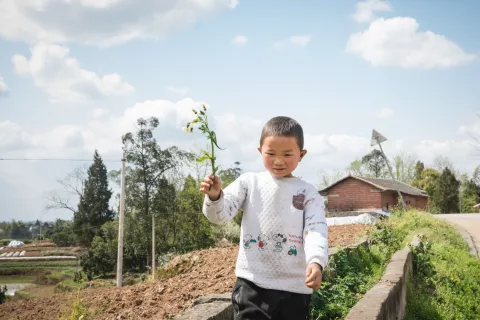Transforming kindergarten for young children in rural China
Transforming kindergarten for young children in rural China
- Available in:
- 中文
- English
In five days, I am going to Zhong County again for another field trip. I cannot wait to see my hardworking colleagues in the county and the children and teachers again and see for myself how they have transformed the kindergartens over the past year.
BEIJING, China, 20 November 2014
Youjun and I talked on the phone the other day. She sounded thrilled when she reported the encouraging changes in the project kindergartens in Zhong County, in Chongqing of western China. She spoke of how teachers' professional skills had been enhanced, how the kindergarten environment had been upgraded, and children's activities enriched.
Youjun is a 33 years old with 14 years of experience working in the field of early childhood education, first as a kindergarten teacher and then a head teacher. She looks younger than her age and has a pleasant smile, and her enthusiasm about work is contagious. Over the past year, she has been serving as the leading local expert on the Child Friendly Kindergarten (CFKG) project and played an instrumental role in improving kindergarten quality in Zhong County.
The CFKG project is a partnership with the Ministry of Education and local education authorities with support from IKEA that is being rolled out in five counties in the underdeveloped western China. This project is aimed to facilitate the realization of the Government of China's commitment to universalize early childhood education by 2020, with quality and equity. For the 36 million rural children aged 3 to 6 years old, if a kindergarten does exist, often there are few trained teachers and the facilitates are poor.
It was heart-warming to see the photos that Youjun sent along. The kindergartens are cheerful with children's art works displayed on the wall and the 3-6 year olds reading books donated by UNICEF with the generous support of IKEA and playing donated toys and toys made of natural materials and recycled materials. They are learning and having fun!
A kindergarten is supposed to be like that, no? Well, yes. If you know what the kindergartens were like a year ago, you would be impressed with the transformation.
Turn the clock back to 2013. For many of the 28,387 kindergarten children in Zhong County, going to kindergarten was not fun at all! It was nothing but rote learning, endlessly reciting Chinese characters and pinyin that they do not understand and repeating Arabic numbers and arithmetic that make little sense. There was little time for play or story.
On my field trips, I saw children nibbling pencil and frowning when they were made to do the meaningless exercises. Many children look blank or wiggle impatiently while their teacher lectured them on and on about discipline. Some children yawned. The children were bored, and the teachers were frustrated.
The classrooms are bleak. There was no children's art work displayed on the walls and only hand-me-down desks and benches for primary students.
There are few toys and children's books. To compound the shortage of material resources, teachers are desperately lacking, especially trained teachers. In many of the kindergartens, the majority of the teachers were transferred from primary school. They had little experience working with young children, and they had limited professional training on setting up kindergarten environment or organizing age appropriate activities for young children.
As such, many of the teachers had no idea about the basic principles of early childhood education. They have little understanding that kindergarten years are a time for children to play and did not have the know-how to teach and foster school-readiness competencies such as curiosity, self-regulation, and working with others. Many did not understand that school-readiness competencies lays the foundation for life-long learning and development. Nor did they understand that rote learning stifles children's love of learning hence is counterproductive and detrimental in the long run.
Although the teachers try to do a good job, they grappled. When it comes to organizing activities, they had few choices in their toolkit but rote learning. When the children are bored by the meaningless repetitive practices or bored with doing nothing and become restless, the teachers resort to “disciplining” in class management, which does not help. It is depressing for the children and frustrating for the teachers.
That was the way things were in the middle of 2013 when we initiated the Child Friendly Kindergarten project. The objective is to make the kindergartens places of playing and learning and ultimately promote children's school readiness competencies.
In order to make the transformation happen and sustain the changes, our strategy has been to empower the local educators and put them ultimately in the driving seat. We guided the Zhong County Education Bureau colleagues as well as county level experts including Youjun to think through and lead the design and implementation of this project.
Our Zhong County colleagues were quick to see the value and decided to adapt a 3-step plan, starting with a small cohort of 15 pilot kindergartens and gradually expanding it to all of the 176 kindergartens over the course of three years. They started by conducting field studies to better understand the issues in the kindergartens. Based on these findings, they chose training modules that match the teachers' needs. For instance, how to set up environment for various activities such as building blocks, role play, reading, and art work. The county experts led by Youjun provided follow-up on-site technical support to make sure the teachers translate what they learned in training into practice.
The trained teachers started applying the practical skills in their daily work, organizing child-centred and play-based activities. To the teachers' amazement, the children are engaged in the activities, and the teachers do not need to spend a large chunk of time “disciplining” the children. The children have fun and develop new skills; the teachers are relieved.
However, not all issues can be solved overnight. In many of the rural kindergartens, often times a teacher has to work with up to 80 children in a class and there is no assistant teacher or caregiver to back her up. Many rural kindergartens also lack proper sanitation and water facilities that also can compromise the child's health and safety.
There is little doubt though that Youjun and her colleagues are committed to realizing the dream of making more rural children benefit from quality early childhood education. Despite the challenges, Youjun and her colleagues are determined to see the work through, because they understand the investment will benefit both the children and have a lasting impact on the county's long term development and prosperity. They have seen what a difference it has made in the children's lives.
There are 137,300 rural kindergartens across China. Imagine, what it would be like if we could replicate what we managed to achieve in Zhong County in more kindergarten across China.





